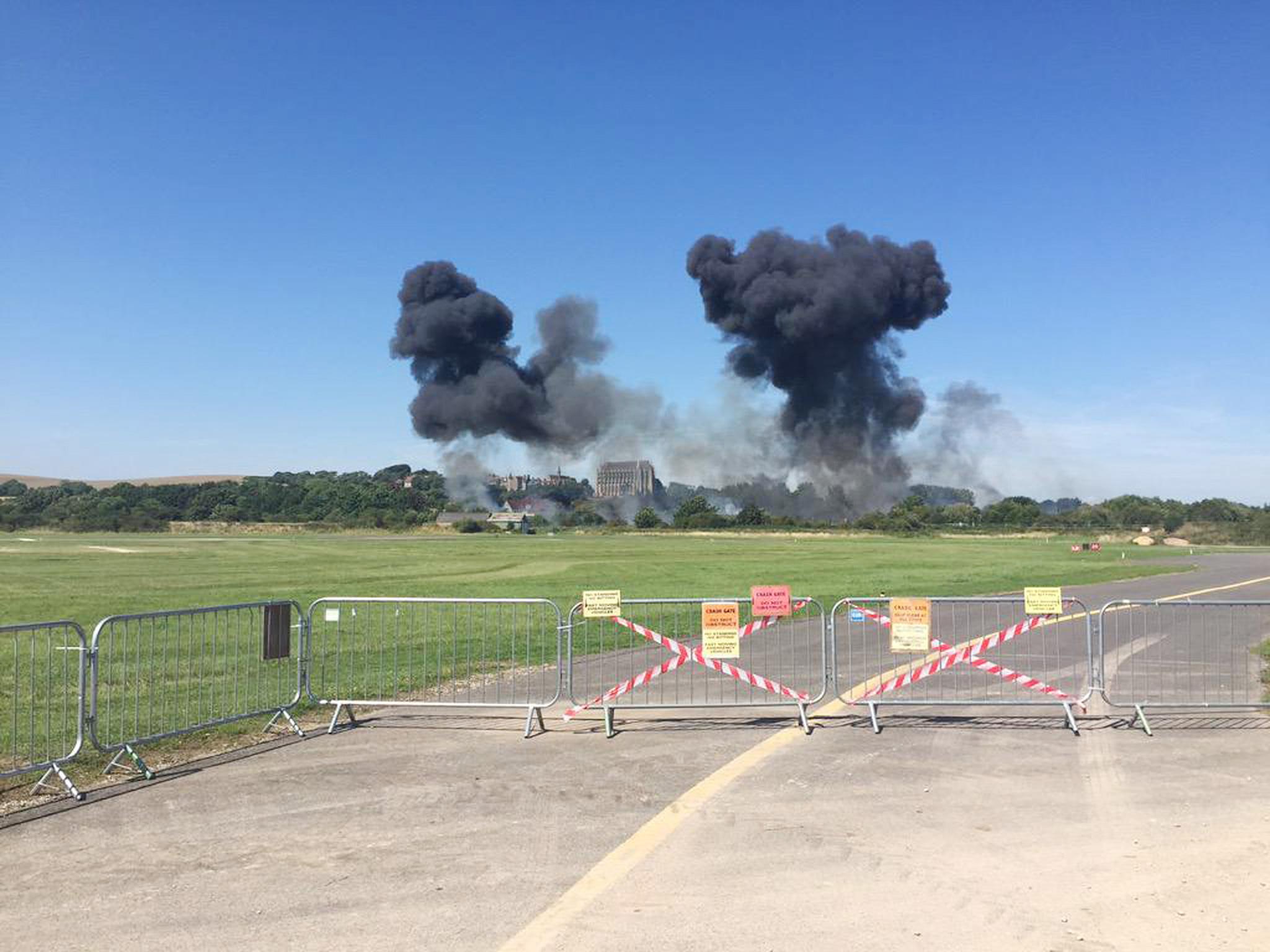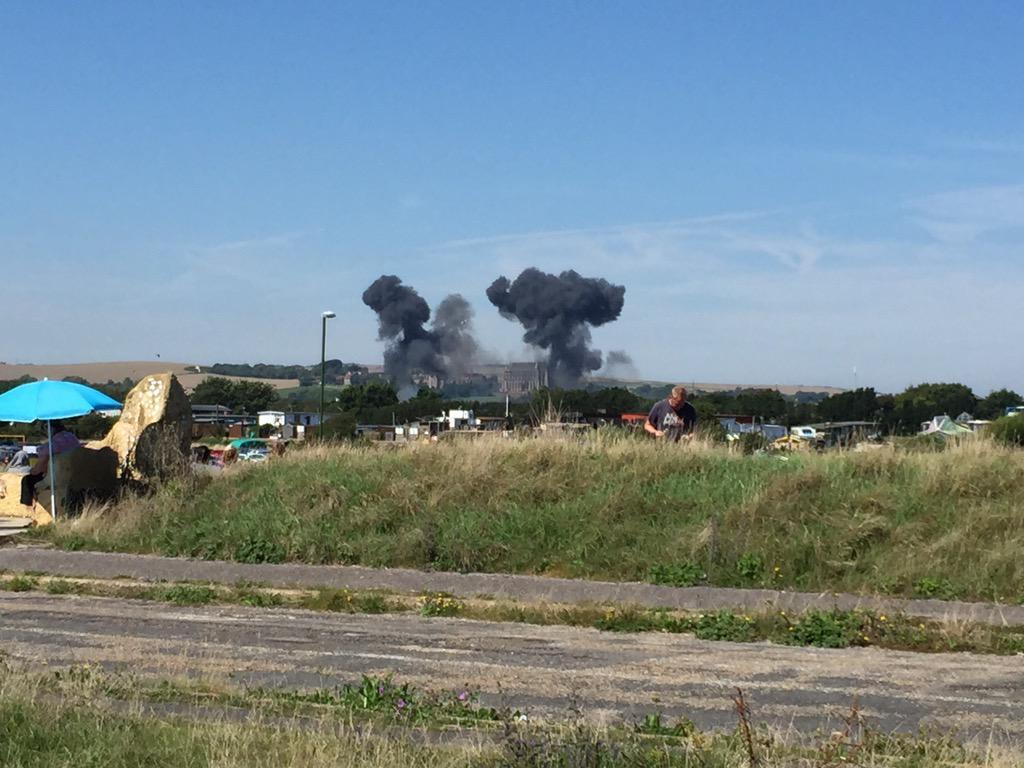Shoreham air show plane crash: Police say death toll may rise above seven as pilot fights for his life
It is the worst airshow disaster in this country for 60 years

Your support helps us to tell the story
From reproductive rights to climate change to Big Tech, The Independent is on the ground when the story is developing. Whether it's investigating the financials of Elon Musk's pro-Trump PAC or producing our latest documentary, 'The A Word', which shines a light on the American women fighting for reproductive rights, we know how important it is to parse out the facts from the messaging.
At such a critical moment in US history, we need reporters on the ground. Your donation allows us to keep sending journalists to speak to both sides of the story.
The Independent is trusted by Americans across the entire political spectrum. And unlike many other quality news outlets, we choose not to lock Americans out of our reporting and analysis with paywalls. We believe quality journalism should be available to everyone, paid for by those who can afford it.
Your support makes all the difference.Seven people have been killed in the worst airshow disaster in this country for 60 years, after a vintage jet fighter plunged into a busy dual carriageway during an aerial display at Shoreham Airshow.
The Hunter jet crashed and burst into flames close to a public house and Lancing College, a boarding school that during term-time is home to hundreds of pupils.
The pilot, believed to be former RAF fast-jet pilot Andy Hill, 51, was a regular stunt flier on the summer airshow circuit.
Thousands of spectators watched in horror at 1.20pm on Saturday as his aircraft slammed into the ground. Police said that Mr Hill had been airlifted to the Royal Sussex County Hospital, where he was in a critical condition.
All seven victims on the ground died at the scene after the 1950s-era Hawker Hunter fighter jet crashed into busy traffic on the A27 in West Sussex.
Superintendent Jane Derrick of Sussex Police warned that more bodies could be found overnight and throughout today as searches of the road and the surrounding area continued. “It is possible we are going to find more casualties at the scene,” she said.
It was only minutes into the afternoon’s display that the aircraft, which is believed to be based at North Weald Airfield in Essex, and owned by petrol station millionaire Graham Peacock, crashed into “several vehicles” while attempting a “loop-the-loop”.
Video footage of the aftermath shared online shows the mangled wreckage of several cars. Footage of the aircraft’s last moments reveals it performed the loop during a stunt to the north of the airfield, but was unable to complete the manoeuvre and crashed on to the road, bursting into a huge fireball.
The South East Coast Ambulance Service said that in addition to the seven fatalities, thought to include two cyclists, 14 people had been injured.
A Downing Street spokesman said the Prime Minister’s “thoughts and prayers are with the families and friends of the victims”.
The show was to continue today but has been cancelled. Police said the road was damaged and could still be closed for the start of the week.
Tony Wallace, 48, who saw the crash from a nearby hill, said: “The Hunter came from the airport and flew over us and did the loop-the-loop to go back around to Shoreham airport, but at the bottom of the loop it just seemed to lose power and went into the ground belly down in a massive ball of flames.
“We could see it all; it went down on the A27 by the [traffic] lights near the airport. That road has been chock-a-block all day. There’s still a plume of smoke, fire crews and a car covered in foam. It looks like a war zone. There are around 200 people watching it here and there was a gasp of horror. People are shell-shocked.”
Craig Wood-Ellis, 31, who witnessed the crash at Shoreham airport, said he saw a “huge ball of flames” as the aircraft failed to “pull out of a manoeuvre”. He added: “There was just a moment of shock as people believed it couldn’t have happened. There was smoke everywhere on the horizon.”
Ten fire crews and several medical evacuation helicopters attended the scene and Royal Sussex County Hospital declared a major emergency. All seven victims were pronounced dead at the scene, while two men were taken to hospital, one in a critical condition, thought to be the pilot, and one with minor injuries.
The crash, which caused major traffic disruption and left thousands of spectators temporarily stranded at the venue, is the worst airshow disaster since 31 spectators were killed at Farnborough Airshow in 1952.
Mr Hill trained with the RAF in the 1980s and flew Harrier jump jet ground-attack fighters before retraining as a commercial airline pilot and setting up a business offering IT services to pilots. His website documents how he and his wife, Ellie, also a pilot, spend their spare time constructing kit aircraft at their home in Buntingford in Hertfordshire.

Colin Boyd, operations manager at Hunter Flight Academy, which operates several examples of the type of aircraft involved in the crash, and who knew Mr Hill, said: “The Hunter world is a close-knit community and this has come as a terrible shock. It’s horrible news. We are all thinking of his family.”
Pilot David Wildridge, who had flown a display at the show before the crash, said: “He is a highly experienced pilot, well-known and well-loved. He is highly professional and it is totally unusual for this to happen.
“He was a Harrier pilot in the air force. They are the top RAF pilots – the best of the best.”
The Hawker Hunter jet first entered service with the RAF as an air defence fighter in 1950s and served as a fighter and fighter-bomber throughout the 1950s and early 1960s. Often described as the best-looking jet fighter ever built, several dozen are still flying worldwide and it is a popular attraction at airshows.
The crash is one of a string of accidents involving vintage aircraft this summer, prompting calls for greater regulation of older aircraft. However, former air accident investigator Tony Cable, who also investigated military crashes, said the aircraft’s age would “not radically alter the investigation”.
He said: “It’s too early to speculate but classic aircraft are a grey area and are a difficult one to manage for the Civil Aviation Authority in terms of airworthiness, particularly with features like ejector seats, which may not be activated in older aircraft.
“In a case such as this, the investigators or the Air Accident Investigations Branch will of course be looking for pilot error, but looking – as this plane was performing [stunts] – at whether there was an issue with the fuel feed system and whether it could put up with those manoeuvres, such as the loop-the-loop. It could have been a temporary fuel starvation issue.”
Later in the day a scheduled fly-past by the last flying Vulcan bomber at the Shoreham Airshow was delayed so the aircraft could offer a “quiet flypast salute along the display line” for those affected by the disaster.
Additional reporting by Harvey Day and Rose Troup Buchanan
Join our commenting forum
Join thought-provoking conversations, follow other Independent readers and see their replies
Comments